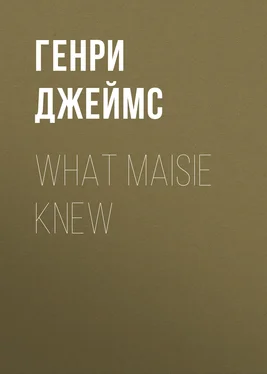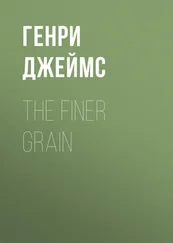Генри Джеймс - What Maisie Knew
Здесь есть возможность читать онлайн «Генри Джеймс - What Maisie Knew» — ознакомительный отрывок электронной книги совершенно бесплатно, а после прочтения отрывка купить полную версию. В некоторых случаях можно слушать аудио, скачать через торрент в формате fb2 и присутствует краткое содержание. Жанр: foreign_children, foreign_antique, foreign_prose, на английском языке. Описание произведения, (предисловие) а так же отзывы посетителей доступны на портале библиотеки ЛибКат.
- Название:What Maisie Knew
- Автор:
- Жанр:
- Год:неизвестен
- ISBN:нет данных
- Рейтинг книги:4 / 5. Голосов: 1
-
Избранное:Добавить в избранное
- Отзывы:
-
Ваша оценка:
- 80
- 1
- 2
- 3
- 4
- 5
What Maisie Knew: краткое содержание, описание и аннотация
Предлагаем к чтению аннотацию, описание, краткое содержание или предисловие (зависит от того, что написал сам автор книги «What Maisie Knew»). Если вы не нашли необходимую информацию о книге — напишите в комментариях, мы постараемся отыскать её.
What Maisie Knew — читать онлайн ознакомительный отрывок
Ниже представлен текст книги, разбитый по страницам. Система сохранения места последней прочитанной страницы, позволяет с удобством читать онлайн бесплатно книгу «What Maisie Knew», без необходимости каждый раз заново искать на чём Вы остановились. Поставьте закладку, и сможете в любой момент перейти на страницу, на которой закончили чтение.
Интервал:
Закладка:
She was now old enough to understand how disproportionate a stay she had already made with her father; and also old enough to enter a little into the ambiguity attending this excess, which oppressed her particularly whenever the question had been touched upon in talk with her governess. "Oh you needn't worry: she doesn't care!" Miss Overmore had often said to her in reference to any fear that her mother might resent her prolonged detention. "She has other people than poor little you to think about, and has gone abroad with them; so you needn't be in the least afraid she'll stickle this time for her rights." Maisie knew Mrs. Farange had gone abroad, for she had had weeks and weeks before a letter from her beginning "My precious pet" and taking leave of her for an indeterminate time; but she had not seen in it a renunciation of hatred or of the writer's policy of asserting herself, for the sharpest of all her impressions had been that there was nothing her mother would ever care so much about as to torment Mr. Farange. What at last, however, was in this connexion bewildering and a little frightening was the dawn of a suspicion that a better way had been found to torment Mr. Farange than to deprive him of his periodical burden. This was the question that worried our young lady and that Miss Overmore's confidences and the frequent observations of her employer only rendered more mystifying. It was a contradiction that if Ida had now a fancy for waiving the rights she had originally been so hot about her late husband shouldn't jump at the monopoly for which he had also in the first instance so fiercely fought; but when Maisie, with a subtlety beyond her years, sounded this new ground her main success was in hearing her mother more freshly abused. Miss Overmore had up to now rarely deviated from a decent reserve, but the day came when she expressed herself with a vividness not inferior to Beale's own on the subject of the lady who had fled to the Continent to wriggle out of her job. It would serve this lady right, Maisie gathered, if that contract, in the shape of an overgrown and underdressed daughter, should be shipped straight out to her and landed at her feet in the midst of scandalous excesses.
The picture of these pursuits was what Miss Overmore took refuge in when the child tried timidly to ascertain if her father were disposed to feel he had too much of her. She evaded the point and only kicked up all round it the dust of Ida's heartlessness and folly, of which the supreme proof, it appeared, was the fact that she was accompanied on her journey by a gentleman whom, to be painfully plain on it, she had—well, "picked up." The terms on which, unless they were married, ladies and gentlemen might, as Miss Overmore expressed it, knock about together, were the terms on which she and Mr. Farange had exposed themselves to possible misconception. She had indeed, as has been noted, often explained this before, often said to Maisie: "I don't know what in the world, darling, your father and I should do without you, for you just make the difference, as I've told you, of keeping us perfectly proper." The child took in the office it was so endearingly presented to her that she performed a comfort that helped her to a sense of security even in the event of her mother's giving her up. Familiar as she had grown with the fact of the great alternative to the proper, she felt in her governess and her father a strong reason for not emulating that detachment. At the same time she had heard somehow of little girls—of exalted rank, it was true—whose education was carried on by instructors of the other sex, and she knew that if she were at school at Brighton it would be thought an advantage to her to be more or less in the hands of masters. She turned these things over and remarked to Miss Overmore that if she should go to her mother perhaps the gentleman might become her tutor.
"The gentleman?" The proposition was complicated enough to make Miss Overmore stare.
"The one who's with mamma. Mightn't that make it right—as right as your being my governess makes it for you to be with papa?"
Miss Overmore considered; she coloured a little; then she embraced her ingenious friend. "You're too sweet! I'm a real governess."
"And couldn't he be a real tutor?"
"Of course not. He's ignorant and bad."
"Bad—?" Maisie echoed with wonder.
Her companion gave a queer little laugh at her tone. "He's ever so much younger—" But that was all.
"Younger than you?"
Miss Overmore laughed again; it was the first time Maisie had seen her approach so nearly to a giggle.
"Younger than—no matter whom. I don't know anything about him and don't want to," she rather inconsequently added. "He's not my sort, and I'm sure, my own darling, he's not yours." And she repeated the free caress into which her colloquies with Maisie almost always broke and which made the child feel that her affection at least was a gage of safety. Parents had come to seem vague, but governesses were evidently to be trusted. Maisie's faith in Mrs. Wix for instance had suffered no lapse from the fact that all communication with her had temporarily dropped. During the first weeks of their separation Clara Matilda's mamma had repeatedly and dolefully written to her, and Maisie had answered with an enthusiasm controlled only by orthographical doubts; but the correspondence had been duly submitted to Miss Overmore, with the final effect of its not suiting her. It was this lady's view that Mr. Farange wouldn't care for it at all, and she ended by confessing—since her pupil pushed her—that she didn't care for it herself. She was furiously jealous, she said; and that weakness was but a new proof of her disinterested affection. She pronounced Mrs. Wix's effusions moreover illiterate and unprofitable; she made no scruple of declaring it monstrous that a woman in her senses should have placed the formation of her daughter's mind in such ridiculous hands. Maisie was well aware that the proprietress of the old brown dress and the old odd headgear was lower in the scale of "form" than Miss Overmore; but it was now brought home to her with pain that she was educationally quite out of the question. She was buried for the time beneath a conclusive remark of her critic's: "She's really beyond a joke!" This remark was made as that charming woman held in her hand the last letter that Maisie was to receive from Mrs. Wix; it was fortified by a decree proscribing the preposterous tie. "Must I then write and tell her?" the child bewilderedly asked: she grew pale at the dreadful things it appeared involved for her to say. "Don't dream of it, my dear—I'll write: you may trust me!" cried Miss Overmore; who indeed wrote to such purpose that a hush in which you could have heard a pin drop descended upon poor Mrs. Wix. She gave for weeks and weeks no sign whatever of life: it was as if she had been as effectually disposed of by Miss Overmore's communication as her little girl, in the Harrow Road, had been disposed of by the terrible hansom. Her very silence became after this one of the largest elements of Maisie's consciousness; it proved a warm and habitable air, into which the child penetrated further than she dared ever to mention to her companions. Somewhere in the depths of it the dim straighteners were fixed upon her; somewhere out of the troubled little current Mrs. Wix intensely waited.
VII
It quite fell in with this intensity that one day, on returning from a walk with the housemaid, Maisie should have found her in the hall, seated on the stool usually occupied by the telegraph-boys who haunted Beale Farange's door and kicked their heels while, in his room, answers to their missives took form with the aid of smoke-puffs and growls. It had seemed to her on their parting that Mrs. Wix had reached the last limits of the squeeze, but she now felt those limits to be transcended and that the duration of her visitor's hug was a direct reply to Miss Overmore's veto. She understood in a flash how the visit had come to be possible—that Mrs. Wix, watching her chance, must have slipped in under protection of the fact that papa, always tormented in spite of arguments with the idea of a school, had, for a three days' excursion to Brighton, absolutely insisted on the attendance of her adversary. It was true that when Maisie explained their absence and their important motive Mrs. Wix wore an expression so peculiar that it could only have had its origin in surprise. This contradiction indeed peeped out only to vanish, for at the very moment that, in the spirit of it, she threw herself afresh upon her young friend a hansom crested with neat luggage rattled up to the door and Miss Overmore bounded out. The shock of her encounter with Mrs. Wix was less violent than Maisie had feared on seeing her and didn't at all interfere with the sociable tone in which, under her rival's eyes, she explained to her little charge that she had returned, for a particular reason, a day sooner than she first intended. She had left papa—in such nice lodgings—at Brighton; but he would come back to his dear little home on the morrow. As for Mrs. Wix, papa's companion supplied Maisie in later converse with the right word for the attitude of this personage: Mrs. Wix "stood up" to her in a manner that the child herself felt at the time to be astonishing. This occurred indeed after Miss Overmore had so far raised her interdict as to make a move to the dining-room, where, in the absence of any suggestion of sitting down, it was scarcely more than natural that even poor Mrs. Wix should stand up. Maisie at once enquired if at Brighton, this time, anything had come of the possibility of a school; to which, much to her surprise, Miss Overmore, who had always grandly repudiated it, replied after an instant, but quite as if Mrs. Wix were not there:
Читать дальшеИнтервал:
Закладка:
Похожие книги на «What Maisie Knew»
Представляем Вашему вниманию похожие книги на «What Maisie Knew» списком для выбора. Мы отобрали схожую по названию и смыслу литературу в надежде предоставить читателям больше вариантов отыскать новые, интересные, ещё непрочитанные произведения.
Обсуждение, отзывы о книге «What Maisie Knew» и просто собственные мнения читателей. Оставьте ваши комментарии, напишите, что Вы думаете о произведении, его смысле или главных героях. Укажите что конкретно понравилось, а что нет, и почему Вы так считаете.












